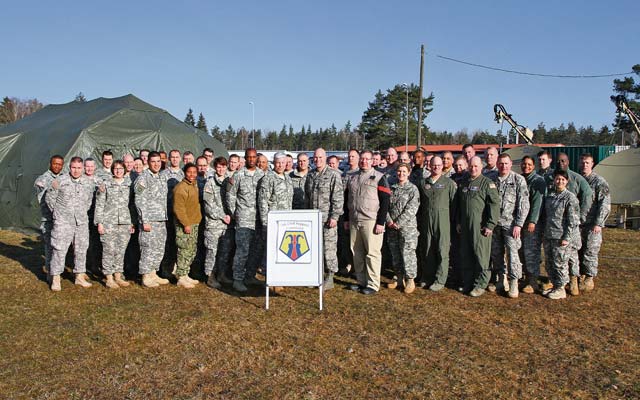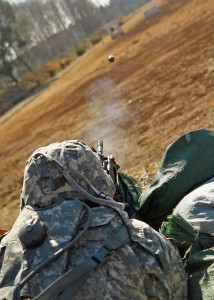
Brig. Gen. Arlan M. DeBlieck (middle left), commanding general of the 7th Civil Support Command, takes a moment with his entire senior staff and joint task force for a photo opportunity during Citizen Response 15 March 9 in Grafenwöhr, Germany.
GRAFENWÖHR, Germany — When disaster strikes, Europe-based U.S. Army Reserve Soldiers stand ready to save lives, provide stability, assess damage, minimize suffering and restore essential services.
During the Citizen Response 15 exercise, Soldiers from the 7th Civil Support Command in Kaiserslautern tested their ability to deploy with other U.S. military services and allied partners in the aftermath of an earthquake.
“Citizen Response is designed to exercise our expeditionary capabilities,” said Brig. Gen. Arlan M. DeBlieck, the 7th CSC’s commanding general, during an on-air radio interview with AFN Bavaria. “We have multiple services, bringing them into a joint staff. So, this is an opportunity to exercise our technical expertise, but more importantly, our staff capabilities — a unified effort to a single response.”

The two-week event began Feb. 28 and served as annual training for the Reserve Soldiers. Some 7th CSC Soldiers set up a command post at Grafenwöhr Training Area and meanwhile, near Ciudad Real, Spain, other Soldiers joined a U.S. Navy-led task force in Daimiel 15, an earthquake response exercise. Troops from Spain, Morocco, Algeria and France also took part, DeBlieck said.
Overall, more than 3,500 troops were involved in the simultaneous exercises. The efforts in both Germany and Spain tested Soldiers’ ability to oversee response efforts, provide civil affairs support and react to a challenging scenario that simulated a rapidly changing environment. Meanwhile, some Soldiers refreshed their lifesaving skills, advanced driving and map reading skills while others fired pistols, rifles and machine guns.
This kind of training is important for Soldiers who have already served in combat and is vital for those who have yet to deploy, said Sgt. Justin Arrington, combat engineer and Iraq veteran.
“Downrange, you never know what position you’ll be put in. You’re not always going to be at a desk. If something happens on base, you’re going to be off that desk,” Arrington said. “We have different jobs, but we’re all Soldiers. We all have to be able to protect and defend.”
Honorably discharged from active duty in 2007, Arrington, 36, of Washington Court House, Ohio, settled in Germany and started a family. In 2009, he joined the 7th CSC, earned an Army Reserve college scholarship and is completing a graphic design degree. He now works for the marketing department at U.S. Army Garrison Wiesbaden’s directorate of Family and Morale, Welfare and Recreation, but if the Army needs him to deploy, training in disaster response scenarios such as Citizen Response, keeps his skills sharp, Arrington said.
“Situations like this could happen at a moment’s notice. We’re the ones who are specialized to move out a moment’s notice,” Arrington said. “That’s why people talk about the 7th. They know there’s a need for the capabilities and we have the assets to make it happen.”
Training for the 7th CSC Soldiers began in Kaisers-lautern by packing gear and equipment in addition to preparing vehicles for a convoy. Leadership, teamwork and relationships strengthened during garrison days as well as important bonds or the tasks ahead. A small group launched to Grafenwöhr’s Camp Normandy, setting up the 7th CSC’s command post; a set of heated, green tents set in a field. Soldiers shrugged off the cold winter chill known well to troops who have trained at the sprawling U.S. training area in Eastern Bavaria. They set up computers, generators and satellite radios.
After pre-deployment operations on Daenner Kaserne, some Soldiers flew to Rota Naval Base, Spain, while others drove in tactical vehicles to Grafenwöhr. Several Reserve units supported the 7th CSC missions, including the 361st Civil Affairs Brigade, the Medical Support Unit- Europe, the 773rd Civil Support Team, the 221st Public Affairs Detachment and the 209th Digital Liaison Detachment.
The task force was augmented by the Defense Threat Reduction Agency and the 111th Attack Wing, 11th Air Operations Group, a Pennsylvania Air National Guard unit from Horsham Air Guard Station near Philadelphia.
In Spain, at Daimiel 15, Soldiers from the command provided Chemical, Biological, Radiological and Nuclear response, in addition to civil affairs, medical, and mission command capabilities to Combined Task Force 68, under the Naval Expeditionary Task Force Europe and Africa.
This year’s citizen response built upon last year’s exercise, held in Baumholder, Germany and in Bulgaria, said Capt. Rocky Robinson, a 7th CSC operations officer.
“It’s been a phenomenal effort,” Robinson said. “I think we took it to another level. That’s a tribute to the leadership of Brigadier General DeBlieck and the hard work that our Soldiers put into this.”


